{
"authors": [
"Shi Zhiqin",
"Brigitte Vassort-Rousset",
"Li Wei"
],
"type": "event",
"centerAffiliationAll": "",
"centers": [
"Carnegie Endowment for International Peace",
"Carnegie China"
],
"collections": [
"China’s Foreign Relations",
"U.S.-China Relations"
],
"englishNewsletterAll": "",
"nonEnglishNewsletterAll": "",
"primaryCenter": "Carnegie China",
"programAffiliation": "",
"programs": [],
"projects": [],
"regions": [
"North America",
"United States",
"East Asia",
"China",
"Eastern Europe",
"Western Europe"
],
"topics": [
"Economy"
]
}
Reconciling Markets and Politics in a Globalized World: Views from China and the West
Tue, May 24th, 2016
Beijing
The world’s three largest economies—the European Union, the United States, and China—are engaged in an increasingly contentious and high-stakes debate over whether to grant market-economy status to China at the end of this year. China maintains that being granted this status was a guaranteed term of its entry into the World Trade Organization. Yet in late May 2016, the European Parliament passed a non-binding resolution against granting China market-economy status, a move that many observers see as a precursor to a binding vote later this year. This ongoing policy debate has enormous economic, commercial, and political implications for key strategic capitals, as well as for broader diplomatic relations between China and its leading trade partners.
Carnegie–Tsinghua’s Shi Zhiqin moderated a discussion about the significance of these recent developments and what they mean for China’s trade ties and broader diplomatic relations with Europe, as well as with other major economies like the United States. This event was co-sponsored by the Tsinghua University Sino-French Research Center.
Discussion Highlights
- China and Globalization: Today, economies around the world are linked more closely than ever. Chinese economic reforms and trade flows since the late 1970s have played a key role in this globalization trend, panelists noted. One speaker asserted that ongoing economic reforms in China depend on further deepening and improving China’s economic engagement with other countries. This panelist suggested that there would be high costs if Beijing’s reform efforts were to slow or come to an end, especially since China has become the largest trading nation in the world. However, as some citizens in Europe and the United States raise doubts about the benefits of globalization, China may very well emerge as an even more influential global advocate of economic interconnectedness.
- Heightened Opposition to Globalization: Although globalization remains an active force, most of the speakers asserted that Western opposition to it is growing. Populist politicians throughout Europe and the United States have voiced concerns about free trade agreements. One panelist pointed out that another factor fueling concerns about globalization is that economic interest groups within various countries want to maintain the trade advantages they enjoy over foreign competitors. Another panelist asserted that China engaged in economic reforms to integrate itself into a Western-centric international order based on the principles of free trade that critics of globalization do not accept as true. The fate of trade deals such as the Trans-Pacific Partnership is closely tied to policy debates over the merits of economic openness.
- The Market Economy Status Debate: China and its trade partners in Europe and the United States are engaged in a high-stakes debate about whether or not to classify China as a market economy, a decision that will impact how other countries treat goods they import from China. One panelist concluded that China should not be considered a market economy because it is a hybrid market characterized by heavy government control in many but not all sectors. Other panelists maintained that China should be recognized as a market economy, saying that state intervention in markets is not unique to China. They further reasoned that China is the largest trade nation in the world and that the market-economy status designation would encourage further reforms in China. The outcome of this debate will have a sizable impact on China’s economic relations with its leading trade partners.
- Different Negotiating Styles: China and its economic partners in Europe and the United States have very different approaches to the question of market-economy status, panelists agreed. Washington and Brussels have specific legal provisions that determine what constitutes a free-market economy based on factors such as currency convertibility, foreign investment, and government control over resource allocation. One speaker stressed that China prefers to resolve disagreement with other countries through bilateral negotiations that weigh the relationship between the two parties more heavily than stringent legal guidelines. Based on this perspective, a panelist stated that Europe should grant China market-economy status in part due to the good relationship between Beijing and Brussels.
- Elections and the Future: Upcoming national elections this year in several Western countries—including the United States, the United Kingdom, and Spain—could profoundly affect ongoing global debates about the benefits and drawbacks of free trade. The results of these elections could have an especially substantial impact on the Chinese economy by affecting the final decisions these Western countries reach about granting China market-economy status. Denying China this designation would allow the European Union and the United States to maintain greater latitude in assessing anti-dumping duties against low-priced Chinese exports. In order for China’s chances of gaining this coveted status to improve, panelists explained, many Western partners seem to believe that China needs to show a firm commitment to further reforms.
Shi Zhiqin
Shi Zhiqin is a resident scholar at the Carnegie–Tsinghua Center for Global Policy, where he runs the China-EU Relations program and the China-NATO dialogue series.
Brigitte Vassort-Rousset
Brigitte Vassort-Rousset is a professor of political science at Jean Moulin Lyon 3 University.
Li Wei
Li Wei is an associate professor in Renmin University's School of International Relations.
Carnegie does not take institutional positions on public policy issues; the views represented herein are those of the author(s) and do not necessarily reflect the views of Carnegie, its staff, or its trustees.
Event Speakers
Shi Zhiqin
Former Resident Scholar, Carnegie-Tsinghua Center for Global Policy
Shi Zhiqin was a resident scholar at the Carnegie-Tsinghua Center until June 2020.
Brigitte Vassort-Rousset
Li Wei